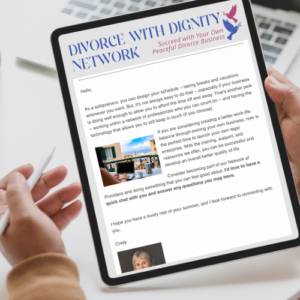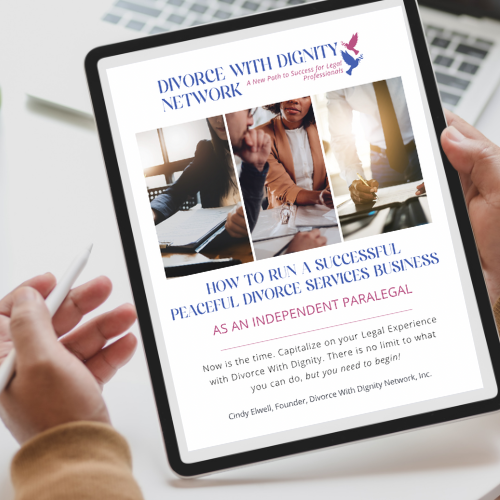Family law covers a lot more than just divorce. As a family law practitioner, you may be called on to handle child support, custody and visitation issues, spousal support, adoptions, even minor emancipation, and adoptions. Just knowing the law isn’t always enough. Your clients come to you for help keeping their family together even when they’re taking it apart. Consider Mediation Mastery.
The law can tell families what to do, but not always the best way to do it. Sometimes spouses and children know what they want, but can’t figure out how to make it work. That’s where mediation comes in. You can help your clients craft an outcome that works for them, and stays within the limits of your state’s laws.
Mediation in Family Law Practice
By the time couples have reached the point of divorce, communications are probably at a low point. Very few couples come to an attorney if they can rationally discuss their divorce and child custody with one another. Nothing derails divorce negotiations like couples who dissolve into shouting matches over minor details.
Mediation helps keep the divorce process on track by helping the parties establish ground rules for the discussions. If the parties can sit in the same room and speak civilly, they can do so. If they’re not able to sit together, “shuttle diplomacy” or remote sessions work just as well, with the mediator acting as a courier and carrying proposals between the two parties.
Mediation is a collaborative process, rather than an adversarial one. Both parties must agree to mediation, and then contribute to the entire procedure. It’s not enough for one party to shrug and say “Whatever they want.” The mediator must work to ensure that both individuals express their wants and desires.
Developing Your Mediation Skills
Not all attorneys are natural mediators. Attorneys are adversarial by nature, and we love a good argument. If you want to add mediation to your family law practice, consider enrolling in a mediation course. Workshops are often available through the state bar, your county family law agency, or from our network of Providers.
You may have the skills of a good mediator and not realize it. Think about the skills you’ve learned as an attorney and compare them to this list of what makes a good mediator:
- An ability to see both sides of an issue. Attorneys need to do this when crafting agreements and developing trial strategies.
- An ability to view things objectively. It’s important to view any client’s case rationally and not become emotionally entangled in a case.
- An ability to think outside the box when coming up with solutions. How often have you heard a judge’s ruling and wished you could offer an alternative that would have given everyone what they wanted?
- The ability to listen carefully to what is said, and also what is not said. When a client says, “My spouse needs to spend more time with our son,” do you ask what their spouse is spending all their time with?
Congratulations, you have most of the skills to become a mediator! Now you just need to fine-tune them for your practice. The goal of mediation is to assist your clients in finding a solution on their own, not to give them a solution you think best.
For example, if the client says “My spouse sits in the office all evening doing overtime work,” your job is not to say “Tell them to stop,” but to ask “What do you think might work?” Then, during the mediation, you would ask the spouse, “Are you spending too much time in the office? What is the reason for that?” You must facilitate conversation, not tell the clients what to do.
Selling Mediation to Your Clients
Most couples in the throes of divorce are not enthusiastic about mediation. If the divorce is contentious already, the last thing they want to do is sit down with their partner and talk things over “one more time.” It’s very important that both parties agree to mediation, otherwise it will not succeed.
There are some marriages which should not go to mediation under any circumstances:
- Cases with domestic violence or sexual abuse
- Any case with allegations of child abuse
- Complex financial situations
- Cases with substance abuse or unresolved mental health issues
- High conflict marriages where communication is no longer possible
In most other cases, if both parties are willing, the mediation can be a success as long as the mediator establishes control over the mediation at the outset. The parties must trust the mediator to be neutral and allow them to develop their own solution, while offering reasonable alternatives when an impasse is reached.
Mediation should be suggested when your clients are stuck over a single issue and negotiations keep collapsing on that one point. For instance, the debts and assets may be done, property division is settled, but the parties cannot manage their visitation schedule without someone storming out of the room. However, the issue is not that complicated to an outside observer, just a question of who gets the weekends over the summer.
When parties have invested tremendous emotional energy into a single issue, they need an impartial third party to help them step back and look at it a different way. This is when you come in and say, “I think I can help.” Mediation should be marketed as an alternative to having a judge look at some documents for a few minutes and make a ruling. The couple knows their problem intimately; they should be the ones to resolve it.
Final Thoughts
The Divorce With Dignity Network has mediators among our Providers who know how to hone the skills of hearing what clients say and what they don’t say. If you want to add mediation to your roster of family law skills, you’re in the right place.
We can help you begin training as a mediator, certify in your state, or just polish the knowledge you already have. Mediation is a great benefit to your clients and your practice. Join the Providers in the Divorce With Dignity Network, and take the next step to enlarging your legal offerings. Schedule your complimentary Success-Strategy Consultation today!





